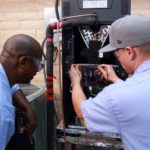Welding forms the backbone of our nation’s infrastructure. It’s the art of blending raw metals into diverse structures, essential for building, repairing, and maintaining the infrastructure we rely on daily. Among welders, there’s a special breed known as Combination Welders. The Swiss Army knives of the welding world, these versatile craftsmen are adept in multiple welding techniques, offering flexibility and mastery in their craft.
If you’re fascinated by the sparks of welding and the idea of wielding a varied skill set, a career as a Combo Welder might be just right for you.
Becoming a Combo Welder demands dedication, hard work, and training. But how long does it take to become one? The timeline varies depending on several factors, but first, let’s delve into what combination welding entails.
What exactly is Combination Welding?
Combination welding is a unique discipline within welding. Unlike specialized welders who focus on one technique, Combo Welders are multi-skilled artisans. They seamlessly switch between various welding procedures including Flux Cored Arc Welding (FCAW), Gas Metal Arc Welding (GMAW), Gas Tungsten Arc Welding (GTAW), and Shielded Metal Arc Welding (SMAW).
This versatility allows them to tackle a myriad of welding challenges by knowing which technique suits each job best and combining methods for optimal results.
Combination welding offers a dynamic workload, enabling welders to master various techniques and work on diverse projects. It’s ideal for those seeking variety and expertise in their career, promising a fulfilling journey of continual growth and challenges in the welding craft.
How Long Does It Take to Become a Combo Welder?
The answer varies depending on several factors, such as:
- Prior welding experience, possibly gained through high school programs.
- The length of a Combination Welding program, which can range from months to years.
- Student status, whether part-time or full-time.
- Time needed to obtain certifications.
Some high schools offer welding classes, providing a head start for students interested in apprenticeships. These apprenticeships typically last three to four years, offering hands-on learning experiences. Alternatively, postsecondary Combination Welding programs, like the one at STVT, can be pursued.
At STVT, our program combines classroom education with hands-on training, fostering confidence in students’ skills. While completion can take as little as 10 months, the duration may vary based on student enrollment status.
Additionally, aspiring Combo Welders may need certifications, like Steel Structural Welding certification in Texas or certificates from the American Welding Society (AWS), to enhance employment prospects and earning potential.
Why is Combination Welding Important?
Combination welding finds applications across industries, forming new metal constructs. Understanding metal properties and welding techniques ensures project integrity. Combo Welders’ versatility and efficiency ensure timely project completion, making them indispensable in maintaining our infrastructure.
Essential Skills for Combo Welders
Combo Welders require several key skills for their dynamic role:
- Technical proficiency in various welding techniques, including FCAW, GMAW, GTAW, and SMAW.
- Attention to detail for precise welds.
- Problem-solving abilities to address welding challenges.
- Physical stamina and adherence to safety protocols.
- Strong communication skills for effective teamwork.
Take the First Step Towards Welding Careers
Training as a Combo Welder is a commitment, offering a dynamic career path. At STVT, we’re dedicated to guiding students from the classroom to the worksite. Our program aligns with AWS standards, which prepares graduates to be skilled in welding techniques and safety practices. We understand each journey is unique and offer personalized support to help students succeed in their chosen career.
Ready to begin training to embark on a career in Combination Welding? Submit a form or call us at (866) 480-9766 for more information.




